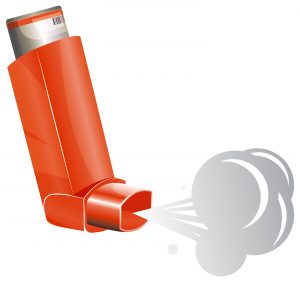Asthma article 2: Disposing of asthma inhalers to reduce their environmental impact
Inhalers used for asthma usually contain gas (called propellant) which is needed to carry the medicine into the lungs in a fine spray. This gas can contribute to global warming. You can help reduce the environmental impact of inhalers by taking old inhalers to your local pharmacy to dispose of properly.
How serious is the environmental impact of inhalers?

Most inhalers used in the UK are pressurised metered dose inhalers (pMDIs) which contain a propellant gas. This gas helps to carry the medicine from the inhaler into the person’s airways in a fine spray. The gases used in pMDIs are hydrofluorocarbons, which contribute to global warming.
The medicine itself does not harm the environment and the propellant gas does not cause any harm to the person using the inhaler.
Why is it important to dispose of inhalers carefully?
- Pressurised metered dose inhalers should not be put in the household rubbish or recycling bin, even when they appear empty, as they may still contain the propellant gas which could leak out over time.
- Used or out-of-date inhalers should be taken to a pharmacy or returned to the manufacturer to dispose of properly.
- They will dispose of inhalers in a way that destroys the propellant without harming the environment.
- Ask your local pharmacist if they have an inhaler recycling scheme in place. Many pharmacies have collection schemes for old (empty or out-of-date) or unused inhalers.
- Do not stockpile inhalers at home. It is important that you have a spare inhaler, but if you have too many, they may end up going out-of-date before they are used.
- Check the inhalers expiry date. Even if your child has not used all the medicine in the inhaler, the reliever inhaler should be replaced with a new one if it has passed the expiry date. This is usually six months after opening it. You can find the expiry date on the bottom of the box, or on the side of the canister.
- Store your reliever inhaler at the right temperature as extreme temperature and high altitudes can affect the inhaler. Check the label on the inhaler for storage instructions or speak to a doctor, pharmacist or asthma nurse for advice.
NHS information on inhalers and the environment
NHS England London CYP (children and young people) Pharmacy Asthma Group have produced a new information leaflet concerning the green agenda and inhalers.
This leaflet informs parents and young people about ways to reduce the environmental impact from inhalers, how to know when the inhaler is empty and how to dispose of them correctly.
The leaflet is available to view here:

